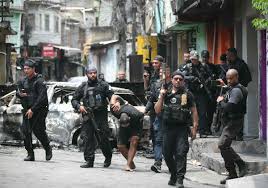Add your promotional text...
The majority of the population of the Brazilian state and city of Rio supports the violent police intervention.
The popularity of the governor, Bolsonaro supporter Cláudio Castro, soared after the operation against organized crime that left 121 dead. President Lula responded to criticism from Rio officials by forming a coordination team between the two governments, expediting a series of parliamentary suggestions to combat criminal groups, such as imposing harsher penalties, and sending two ministers to address the requests of families affected by the operation in the Alemão and Penha prison complexes. The operation, which caused 121 deaths, was deemed "a success." Polls indicate that between 57% and 64% of respondents approve of the police action, while between 27% and 39% disagree. The deadly police ambush against CV gang members will likely propel public safety to the forefront of the upcoming election campaign. The paradox is that, although a majority supports neutralizing criminals with gunfire, more than 50% of Rio de Janeiro residents (52%) feel less safe than before the massacre. Thirty-five percent claim to feel safer after this measure to halt the powerful gang's expansion. The deadly police ambush against CV gang members will likely make public safety a key issue in the upcoming election campaign. Brazil will hold elections for president, governors, and both houses of parliament in October 2026. Luiz Inácio Lula da Silva, the current president, has confirmed his candidacy. Meanwhile, the right wing is searching for a successor to Jair Bolsonaro, who was convicted and barred from holding office. Analysis of surveys conducted by Datafolha and Genial/Quaest shows that support for the trigger-happy policy is significantly higher among men than among women; there are also disparities according to economic level, but not by age or ideological position.
11/2/20251 min read


Contenido de mi publicación
